Leaders in Chicago’s Latinx community reflect on public safety, accountability, and supporting youth after continued police killings in the U.S., including 13-year-old Adam Toledo in Chicago.
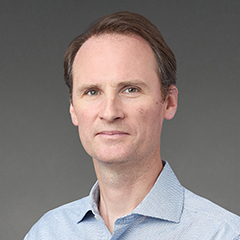
John Palfrey, President
Adam Toledo deserved to be alive today. A Chicago police officer chased 13-year-old Toledo down an alley and fatally shot him, hours before prosecutors opened their case against former Minneapolis police officer Derek Chauvin, who was convicted of murdering George Floyd.
Once again, I write with sadness and in solidarity with Brown and Black communities as we repeatedly relived the final tragic moments of Toledo’s and Floyd’s lives, both of which were captured on video. Our collective trauma seems to know no end as we mourn for Floyd, Breonna Taylor, Duante Wright, and Toledo—one of the latest, and surely not the last, victims of police killings in America. Accountability has been delivered on behalf of Floyd. May his family receive a measure of peace and comfort from the verdict, and may this be a step towards collective healing in our nation.
Our work continues. MacArthur is committed to dismantling the structures that uphold systemic racism and building equitable systems in their place.
To stem the tide of violence against Black and Brown bodies, we need to reimagine public safety, address racial and ethnic disparities in our justice system, and redirect funding to essential social services that are often underfunded. At MacArthur, we are supporting local and national efforts to do just that. Let’s listen to leaders who represent Chicago’s diverse Latinx communities, from Little Village to Brighton Park and from Hermosa to Humboldt Park. Together we can, and must, do more to prevent our children from becoming a hashtag and to support a movement for social justice.
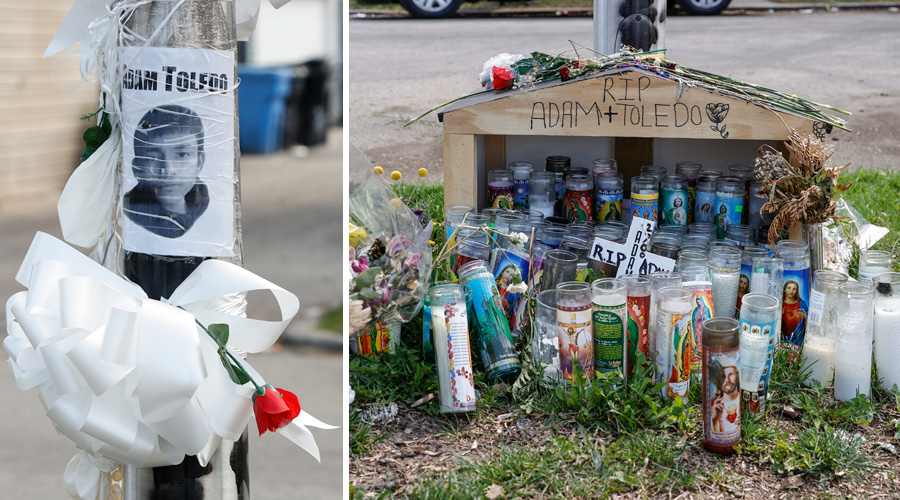
A small memorial where 13-year-old Adam Toledo was shot and killed by a Chicago police officer in the Little Village neighborhood on April 15.
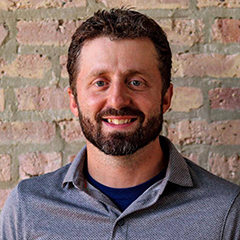
Matt DeMateo, Executive Director, New Life Centers of Chicagoland
Chicagoland, we failed Adam Toledo, we are failing each other, and we are failing ourselves.
Words cannot express the grief and sorrow we feel at Adam’s tragic death. Our collective grief reverberates through our bodies only beginning to absorb the trauma of a 13-year-old boy shot and killed by police. We remember Adam’s life and mourn his death; all through a constant onslaught of hurt, anger, opinions, noise, blame, and guilt. And despite it all, we are left with his loss.
Loss for the Toledo family, our families, our neighborhood, our city, and our world.
Without Adam—a son, brother, student, neighbor, friend, and image-bearer of God.
There is no righting this pain.
We need accountability.
We ask for your accountability where we are failing to love, serve, and protect the young people in our community through our actions and inactions.
We demand accountability of the Chicago Police Department through a transparent investigation and just application of the law.
And we need so much more.
We need time to grieve and mourn.
We need to heal from our trauma.
We need each other.
We need justice.
We need peace.
We need to transform our unjust and racist systems.
We cannot normalize the sin of racial inequity that makes Chicago the city with the largest life-expectancy gap in this country. We cannot normalize the killings of Black and Brown bodies by the very department our tax dollars fund to protect us. We cannot normalize the disinvestment from communities of color that starves young people from opportunities to realize their dreams.
We need to reimagine.
We need to recreate.
It is easy to sit and give opinions, rant, and blame one another; but there is a lot of work to do, and the work is hard.
The work of love.
The work of justice.
The work of healing.
Toledo family, we commit to do better.
Chicagoland, we need to do better, together.
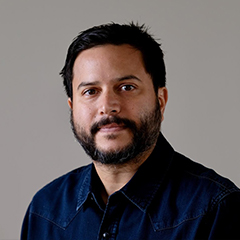
Omar Torres-Kortright, Executive Director, Segundo Ruiz Belvis Cultural Center
Working in a neighborhood arts organization serving teens like Adam, and seeing Adam in the faces of so many of the young people that the center has worked with in its 50-year history, I know that it takes a village to keep our youth safe. That being said, when deadly force is used unjustifiably by those we entrust with the safety of our communities, taking the life of yet another one of our children, I can’t help but to go back and remember.
I remember that time when I was told to wait patiently for things to get better. I remember November 24, 2015 marking my first seven months on the job at Segundo Ruiz Belvis Cultural Center. It was also the date of the release of a gut-wrenching video that was supposed to bring sweeping reform to Chicago and put an end to the decades-old over-policing of our neighborhoods. Laquan McDonald’s case had all the elements to become a real catalyst for transformation and reimagining of public safety in our Black and Brown communities. I realized at that time that the familiarity of tragedy after tragedy was not normal, and simply accepting what was happening was not possible anymore.
Demanding accountability from our leaders and law enforcement, so they also remember exactly who they are supposed to serve and protect, is something we should all be doing—regardless of who we are, how little power we think we have, or what part of the city we call home.
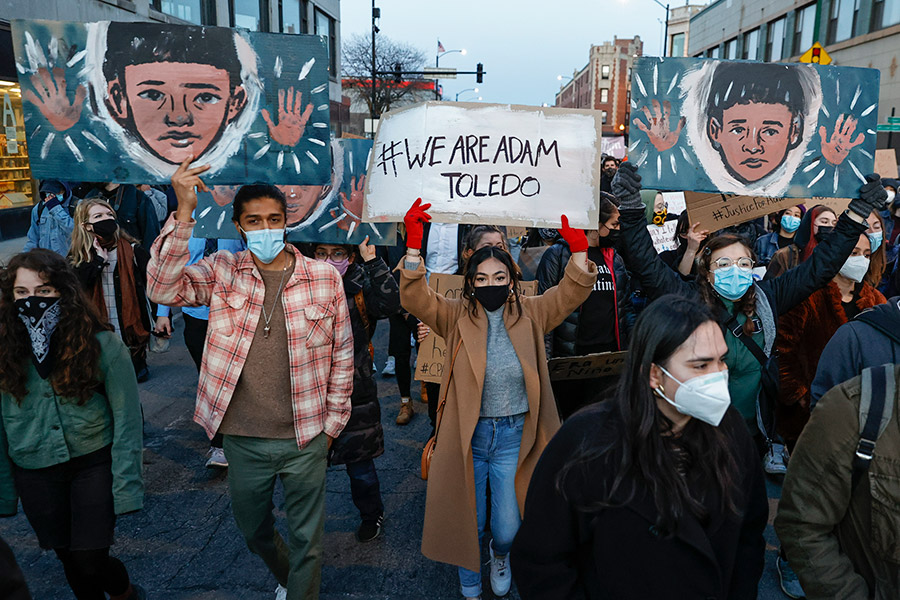
Protesters march through the Logan Square neighborhood during a rally on April 16 in response to the killing of 13-year-old Adam Toledo by a Chicago police officer.
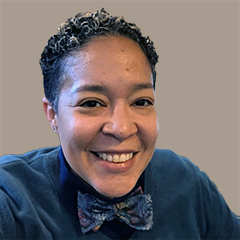
Veronica Ortiz, Director of Clinical Services, Brighton Park Neighborhood Council
Community violence has been codified into the narrative of the South and West Sides of Chicago. Yet, this phenomenon is anything but normal in the long-lasting, negative consequences on Black, Indigenous, and People of Color youth subject to compounded exposure to violence. Low-income communities of Chicago are not only hurt by this violence but have a long history of being disproportionately affected by discrimination, inequity, disenfranchisement, and disinvestment.
As a Chicagoan and clinician, it is hard to ignore the levels of violence and trauma our youth have been exposed to. It is easy to see its effects when having conversations with young individuals when they show little interest in the future or share their experiences leading to mistrust in the school and police systems. There is an alarming level of desensitization to these types of events which tells me that our young people are internalizing what they observe. Our teens are observing an unjust and unsafe world, and without systems in place to combat those negative experiences, cycles of violence and negative mental health symptoms will repeat themselves.
It is our responsibility to protect our youth—keep them physically and emotionally safe. When this is not feasible it is up to us to provide them with space to process scary events and foster positive coping mechanisms. Programs and services geared towards uplifting young people, providing mental health support, enriching activities, and safety are in high demand and are key to combating the long-lasting effects of exposure to trauma. It is critical that we invest time and money in developing trauma informed interventions that are sustainable and mitigate the negative consequences after violence exposure.
Youth programming makes a difference through allowing young people to build trusting relationships with adults and build community. Our youth deserve safe spaces to incorporate their lived experiences and perspectives into activities and opportunities that will reduce the negative effects of trauma. Ultimately, our young people deserve safety and the opportunity to grow up and make a difference in the world.



